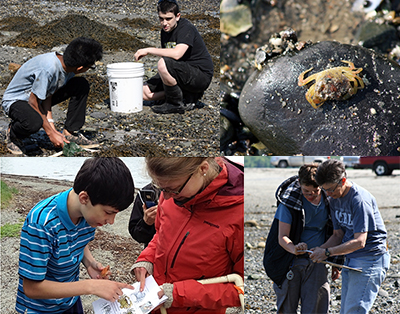SEANET Student Interns Gather Data on Invasive Green Crabs (Maine UCEDD)
August 22, 2016

|
The Center for Community Inclusion and Disability Studies (ME UCEDD), with funding from Maine EPSCoR/Sustainable Ecological Aquaculture Network (SEANET), is partnering with the Community Environmental Health Laboratory (CEHL) at MDI Biological Laboratory to train and engage middle/high school students with disabilities from coastal Hancock County in intertidal census work. CEHL works to identify and help remedy threats to public health and water quality on and around Mount Desert Island. Enrolled students are offered paid internships and receive training in the identification of invasive species, such as green crabs; data collection and data management. Student interns, supervised onsite by mentors, follow a scientific protocol and receive a variety of hands-on worksite skills.
One of the main projects of the Community Environmental Health Laboratory is eelgrass restoration: "eelgrass beds provide habitat for a diversity of marine organisms, and serve as a nursery for a variety of juvenile fish including winter flounder, hake, pollock, and cod, as well as larval lobsters, mussels, and crabs." This summer, SEANET student interns are involved with CEHL's Intertidal Green Crab Census Project at Hadley Point. Green crabs are an invasive species in Maine and have been cited as a possible culprit of eelgrass decline in Frenchman Bay. Green crab surveys are done to obtain information on the extent of the invasion, to show a size distribution of the population, to show changes in the population over time, and to determine which habitats the crabs prefer. More information and photos from the Green Crab Census Project are available on the CCIDS Facebook page.
Janet May, the Maine UCEDD's Coordinator of Transition and Adult initiatives, is the lead on this partnership. Dr. Jane Disney, Senior Staff Scientist and Director of CEHL; and Anna Farrell, Program Coordinator at CEHL; trained the student interns on the scientific protocol used by the Department of Marine Resources for green crab surveys. CEHL also developed a pre- and post-project survey to gauge student learning. CEHL uploads community-collected data into a citizen science database, Anecdata, where it can be viewed, downloaded and analyzed by anyone interested in the data.
About Maine EPSCoR/SEANET: Maine EPSCoR at the University of Maine has received a five-year, $20 million grant from the National Science Foundation (NSF) to establish the Sustainable Ecological Aquaculture Network (SEANET). Maine provides a unique living laboratory to explore sustainable, ecological aquaculture. Three bioregions will be studied through the program looking at the variety of social, ecological, biogeochemical, and oceanographic features that make up the coast of Maine.
Photographs Clockwise: Friendships develop during the Intertidal Green Crab Census Project; Student intern identifying a crab species with Anna Farrell; Close-up of an invasive green crab; Student intern collecting green crab data with Janet May.







